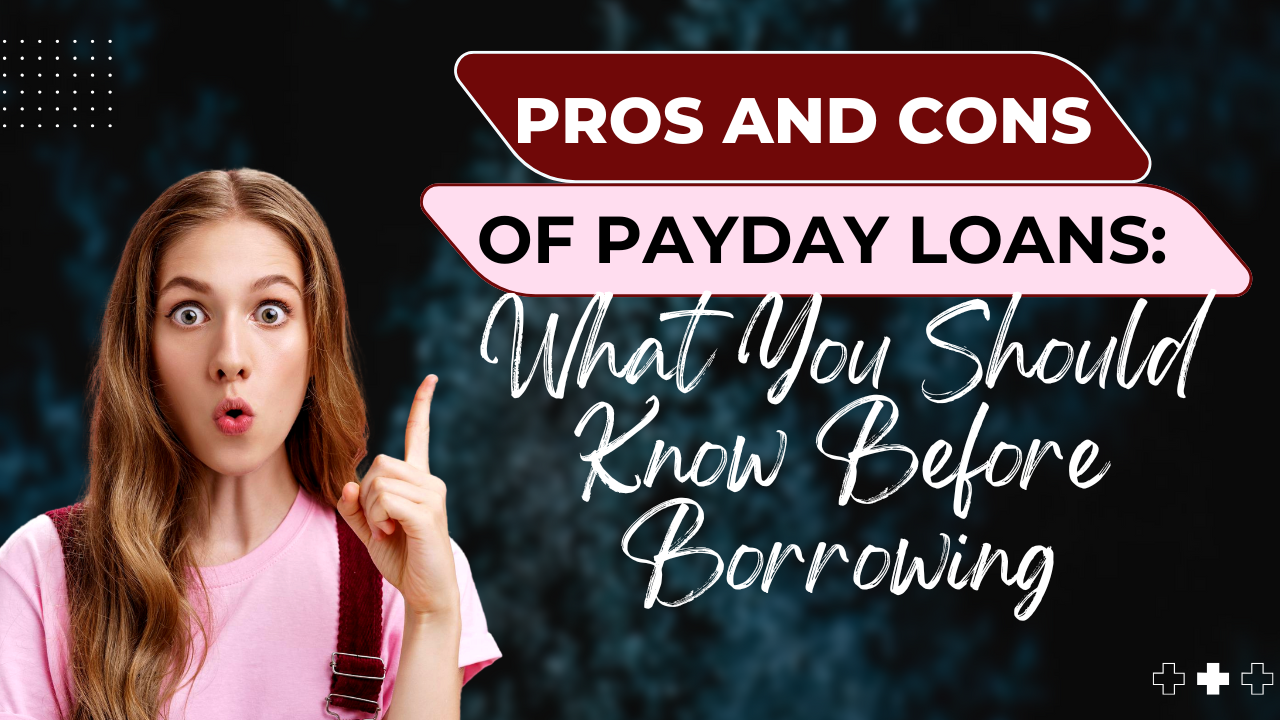In a financial emergency, payday loans can seem like a lifeline—quick, easy, and available even with bad credit. But while they may solve short-term cash problems, payday loans often come with long-term consequences that many borrowers overlook.
Before you borrow, it’s crucial to understand the pros and cons of payday loans, how they work, and why financial experts often caution against them.
What Is a Payday Loan?
A payday loan is a short-term, high-interest loan intended to cover expenses until your next paycheck. These loans are typically for small amounts—ranging from $100 to $1,500—and are due within two to four weeks.
They’re often marketed as a quick fix for emergencies like medical bills, car repairs, or late rent payments. You can get them from storefront lenders, online services, or mobile apps.
Pros of Payday Loans
Despite their controversial reputation, payday loans offer several legitimate benefits—especially for borrowers who are out of options.
1. Fast Approval and Funding
Most payday lenders offer same-day approval and funding, with some online lenders transferring money within minutes. There’s no lengthy paperwork or waiting period, which is ideal during emergencies.
2. No Credit Check Required
Payday lenders typically do not perform hard credit checks. This makes these loans accessible for people with poor or no credit history, who may be denied by banks or credit unions.
3. Simple Application Process
Applications can often be completed online in minutes with just:
-
Proof of income
-
A government-issued ID
-
A checking account
4. No Collateral Needed
Payday loans are unsecured, meaning you don’t have to put up your car, home, or valuables as collateral.
5. Availability
Payday lenders operate in most states and are often open outside traditional banking hours. Online payday loans are available 24/7.
Cons of Payday Loans
The downsides of payday loans are serious and often outweigh the benefits—especially when borrowers can’t repay on time.
1. Extremely High Interest Rates
Payday loans come with Annual Percentage Rates (APRs) that often exceed 300%. A $300 loan can easily turn into a $390 debt within a few weeks if rolled over.
2. Short Repayment Terms
These loans must typically be repaid in two to four weeks, which can create a cycle of debt if you’re already living paycheck to paycheck.
3. Debt Trap Risk
About 80% of payday borrowers roll over their loans or take out another one shortly after repayment. This creates a debt spiral that’s hard to escape.
4. Lack of Regulation in Some States
While some states have laws that limit payday loan interest and fees, others allow predatory lending practices. This means the borrower protections vary significantly depending on your location.
5. No Long-Term Financial Benefit
Payday loans don’t improve your credit score or help you build long-term financial stability. They’re a temporary bandage, not a solution.
Comparison Table: Payday Loans vs. Alternatives
| Feature | Payday Loan | Personal Loan | Credit Card Cash Advance |
|---|---|---|---|
| Credit Check | Not Required | Usually Required | Yes |
| APR Range (Approx.) | 300% – 600% | 6% – 36% | 25% – 30% + fees |
| Repayment Period | 2–4 weeks | 6–60 months | Flexible (min. payment) |
| Amount You Can Borrow | $100 – $1,500 | $1,000 – $50,000+ | Up to card limit |
| Builds Credit? | No | Yes | Yes |
Tips Before Taking a Payday Loan
If you’re considering a payday loan, take these steps first:
-
Explore Alternatives: Consider borrowing from a friend, using a credit union, or asking your employer for a paycheck advance.
-
Read the Fine Print: Understand the full cost of borrowing, including all fees and APR.
-
Set a Repayment Plan: Only borrow what you can afford to repay on your next payday.
-
Check State Laws: Some states cap payday loan rates or offer protections. Visit your state’s Department of Financial Services for details.
Alternatives to Payday Loans
-
Local Credit Unions often provide small-dollar loans with fair terms.
-
Installment Loans offer longer repayment periods with more manageable monthly payments.
-
Buy Now, Pay Later (BNPL) services may offer interest-free installment options.
-
Emergency Assistance Programs: Nonprofits and local government agencies may offer grants or short-term assistance.
FAQs About Payday Loans
Q: Can payday loans affect my credit score?
A: Generally, no. Most payday lenders don’t report to credit bureaus. However, if your loan goes to collections, it can negatively impact your score.
Q: Are payday loans legal in all states?
A: No. Some states have banned payday lending or capped the interest rates. Always check your local laws.
Q: What happens if I can’t repay the loan on time?
A: You may be charged rollover fees, and your loan could go to collections—damaging your credit and finances.
Conclusion: Use with Caution
Understanding the pros and cons of payday loans is essential before signing any agreement. While they may offer fast cash in a crisis, the long-term costs and potential debt traps often outweigh the short-term relief.
If you must take out a payday loan, do so with a clear repayment plan and knowledge of your rights as a borrower. Always explore safer alternatives first—and if payday loans have become a habit, seek help from a nonprofit credit counselor.
